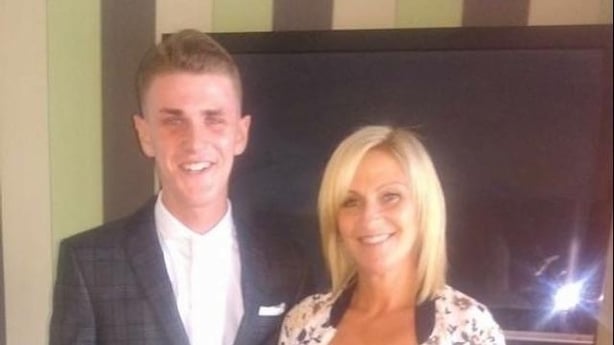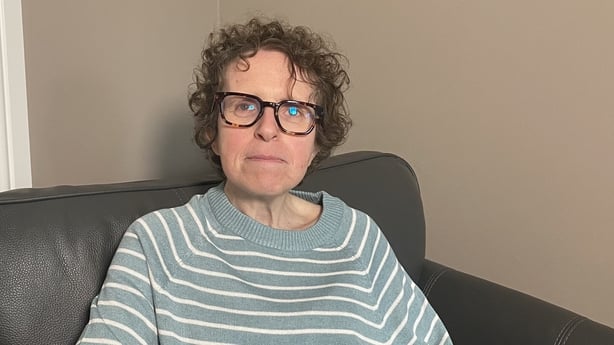The charity Advocates for Victims of Homicide (AdVIC) has said there has been a consistent rise in demand for their services from counselling to legal advice.
Many of its members are bereaved families who are calling for more funding to be provided to enhance and extend these supports.
They say the perpetrators are given significant support when they enter prison and, in contrast, victims' families are not being prioritised in the aftermath of a tragedy.
Last year, 138 people sought the support of AdVIC which was a rise of 4% since 2022.
The organisation focuses on offering "practicalities arising after a homicide" and providing information and support that will help people who are suffering from immense trauma.
Counsellor with AdVIC Niamh Crowley said it is important that people are reaching out to talk.
She has observed a significant rise in demand for therapy from people of all ages with several factors attributed to this.
We need your consent to load this rte-player contentWe use rte-player to manage extra content that can set cookies on your device and collect data about your activity. Please review their details and accept them to load the content.Manage Preferences
"It is hard enough dealing with the death of a loved one, but knowing nothing about the criminal justice system and the media world also, which they might not be au fait with, and these days with social media as well it can be really upsetting as often things are misreported," Ms Crowley said.
"So, it is so important that people have the support of a service to support them as it can be terrifying for people," she added.
Ms Crowley also warns of the possible consequences for people affected by this type of grief.
"We do see if people don’t reach out in certain circumstances like this, people reporting into their GPs or the HSE with anxiety, depression, PTSD, maybe addiction issues as well so it can be really helpful to come and have a chat to a counsellor or psychotherapist after something like this has happened," she said.
She acknowledges that there is "no rule book" on how someone will feel after a homicide with "normal life gone in an instant".
"With counselling when people come to see us it is not that there is going to be a happy ending, or resolve an issue," she said.
"It's really for support because really there is no happy ending," Ms Crowley added.
The support provided by AdVIC counsellors was extended to include teenagers and children in recent years.
It said it is balanced in terms of the number of men and women who are availing of therapy in the aftermath of a loss of a loved one.

There is also no time limit on when someone can request this help.
"Sometimes people come a few weeks after because they are extremely traumatised and frightened and lonely as usually no one around them has been through this experience," explained Ms Crowley.
"And then there are people who don't want to talk to anybody, and they might come months later or even years later."
Janet O’Brien, a mother of three in Tallaght, Co Dublin never expected she would have to reach out for this type of support.
Her 20-year-old son Luke died almost seven years ago after being attacked during a night out with friends.
"We got a phone call at 3 o’clock in the morning to say Luke had been attacked and to make my way to Tallaght Hospital," she recalled.
"I remember thinking at the time I wasn’t so focused on what had happened or who had done what, I just needed to get to Luke. But unfortunately, it was just bad news after bad news," Ms O’Brien.
She describes the immense grief around her son's unexpected death.
"For me as the mam, I was trying to deal with my own heartbreak. I was also trying to hold everything together for Ali and Seán who had just lost their brother, my mam and dad had lost their grandson and my sisters who are like second mams to Luke. I can’t articulate enough the heartbreak," she said.
The support outside of her family proved to be "invaluable" after a garda liaison officer was assigned to her family and provided some vital information.
"I remember them leaving a booklet in my house from AdVIC. I remember seeing homicide and being quite taken aback by this booklet on my kitchen table. It was very surreal. But the booklet had been put together by other bereaved parents," she said.
Ms O’Brien said as much as she did not want to look at it, it turned out to be quite beneficial as it helped her navigate the court system, prepare her victim impact statement and also deal with her grief.
It also allowed her to connect with others who have gone through a similar loss.
"I think it varies from person to person. I know myself I did reach out to different people that I had heard similar stories," she said.

"In some cases, they needed to deal with it in their own way which was totally understandable and then there were some that were willing to talk and help.
"I found it helpful to speak to someone who really knew what I was really going through, someone you could have an open raw conversation with."
For Karen Bishop, there was limited wrap-around supports for her family 32 years ago after her sister Jill was killed as she walked home from a disco in Bray, Co Wicklow.
Her grief-stricken father Ciaran helped to make changes by providing support to other families over several decades.
"More to offer advice to them...we have gone through the courts, gone through the parole boards so we are able to offer them advice and guidance to make it a bit easier for them to deal with their tragedy," she said.
Her family also wants to draw more awareness around who can avail of support beyond family members.
"Because it could be friends that were with the person the night they were killed. They are going to be affected as well," Ms Bishop said.
The threat of reliving their family’s trauma is a constant challenge when they hear someone has been killed.
"Especially if it is a young girl and the same age and you are thinking that poor family. Because you always think that is never going to happen to us.
"Like I am sure back in 1991 we were watching the news not that there were many murders there, but we were thinking, god that poor family.
"It is always going to be there, there is always going to be something on the news that is going to trigger it off again," she added.
Counselling remains a core part of the support for bereaved families with many saying more funding would allow for support to be provided beyond the current 12 sessions that are being offered to adults.
Ms Bishop said she and others are frustrated by the amount of support that is offered to the perpetrators in contrast.
"When you think about it when the perpetrator goes into prison, they have everything at their beck and call, they have a counsellor, psychiatrist and everything.
"More funding has to be given to the victims because we have done nothing wrong. We have to put up a fight and beg sometimes for help which is so, so wrong," she added.
Janet O'Brien echoed that view but did not want it to deter others from reaching out for help.
"My heart just breaks for anybody who is facing this journey, really and truly. I suppose my biggest piece of advice would be to always listen to your gut.
"I know at different times there was certain things I wanted to do. I wanted to raise awareness around one punch attacks and that led me to finding different paths and people who were able to help me do those things," she added.
For anyone affected by the violent death of a loved one can contact Advic.ie.







